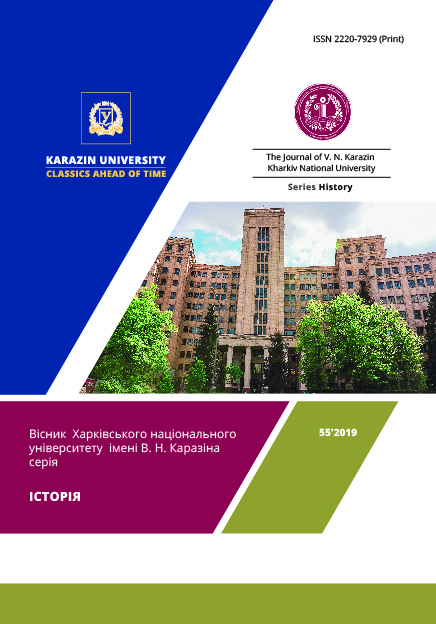Russian Emigration During the Second World War (1939 – 1945)
Abstract
The article discusses the situation of Russian emigrants in Poland. factors of influence on its change. After the defeat of Poland in September 1939 and the Soviet-German non-aggression pact on the territory of Western Belarus and Western Ukraine, Red Army troops entered on September 17, 1939. Here they first met with emigrants. Special groups of the People’s Commissariat of Internal Affairs (NKVD) were stationed in the same territory. The board members of all without exception Russian emigrant organizations: cultural, educational, professional, student, charitable and others were arrested. All of them then disappeared in the Stalinist camps. In central Poland, the German invaders created the governor-general under their complete control. In October 1939, A. Hitler appointed G. Frank the Governor-General of the occupied zone. The latter believed that Poland should become a German colony, and the Poles should becomeslaves of the Great German Empire. In 1939, the Russian population of Poland consisted of Polish citizens and emigrants, their interests were defended by the Russian Committee created in 1940, and it was headed by S. L. Wojciechowski. The committee became a recognized representative of the occupation authority of the Russian part of the population of the Governor General. He issued documents for living in the country and leaving it. After the German attack on the USSR, the chairman of the Russian Committee, S. L. Wojciechowski, believed that the overthrow of the Bolshevik power was possible only with German help. However, A. Hitler and the conductor of German Eastern policy Rosenberg advocated the dismemberment of living space. This scenario does not suit most Russian emigrants. Such is the difficult fate of the Russian emigration during the Second World War.
Downloads
References
Возрождение. Париж. 1939, 22.12.
Война Германии против Советского Союза 1941–1945. Документальная экспозиция г. Берлина. – Берлин, 1992. – 287 с.
Войцеховский С. Л. Эпизоды. Канада, 1978. – 62 с.
Государственный архив Российской федерации (ГАРФ)
За свободу. Варшава. 1925, 08. 03.
Зашкільняк Л., Крикун М. Історія Польщі. – Львів, 2002. – 752 с.
Исмагулова Т. Д. Русская эмиграция в Польше / В. Бранд – поэт и воин «русской Варшавы» / Зарубежная Россия. 1971–1939. Сб. ст. – СПб., 2003. – С. 345–352.
Миссия русской эмиграции. Кн. 1. – Ставрополь, 1992. – 373 с.
Окороков А. В. Русская эмиграция. Политические, военно-политические и воинские организации. 1920–1990. – М., 2003. – 330 с.
Последние новости. Париж. 1939, 31. 10.
Худобородов А. Л. Вдали от России: российские казаки в эмиграции. – Челябинск, 1997. – 112 с.
Фест И. К. Гитлер. Биография. В 3 т. Т. 3. – Пермь, 1993. – 491 с.
Ширер У. Взлет и падение ІІІ рейха. В 2 т. Т. 2. – М., 1991. – 528 с.
Энциклопедия ІІІ рейха / Сост. Воропаев С., Егазаров А. – М., 2000. – 592 с.
Цурганов Ю. С. Неудавшийся реванш. Белая эмиграция во Второй мировой войне. – М., 2001. – 313 с.
Шкаренков Л. К. Агония белой эмиграции. – М., 1987. – 236 с.
Russkie emigranty v radach polskogo Soprotiwlenia Armii Krajowoj v 1939– 1945 gg Russian emigrants and Polish Resistance Mowement Armies Krajowa Narodowe Sily Z. Режим доступа: https: // www. researchgate. net / publication / 306602 772. Доступ: 11.04.2017 г.
Copyright (c) 2019 Yolkin A. I.

This work is licensed under a Creative Commons Attribution 4.0 International License.
Authors who publish with this journal agree to the following terms:
- Authors retain copyright and grant the journal right of first publication with the work simultaneously licensed under a Creative Commons Attribution License that allows others to share the work with an acknowledgement of the work's authorship and initial publication in this journal.
- Authors are able to enter into separate, additional contractual arrangements for the non-exclusive distribution of the journal's published version of the work (e.g., post it to an institutional repository or publish it in a book), with an acknowledgement of its initial publication in this journal.
- Authors are permitted and encouraged to post their work online (e.g., in institutional repositories or on their website) prior to and during the submission process, as it can lead to productive exchanges, as well as earlier and greater citation of published work (See The Effect of Open Access).




